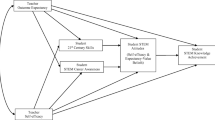Abstract
Outcomes in education are complex and numerous. Seemingly simple instructional choices can have far reaching implications for a student’s interest in a subject, their social network, and even their psychological well-being. These types of outcomes are rarely studied however. Interest in short-term instructional outcomes is far more prevalent, as made evident by the popularity of yearly high-stakes testing. Combatting this trend will require educators and policy makers to consciously investigate the various outcomes, even if only informally. This article offers a taxonomy of educational outcomes to help with this process. The taxonomy assists stakeholders at all levels understand the potential impact of their decisions. The article discusses a variety of delineations to help readers examine potential outcomes, including instructional and educational, short and long-term, and cognitive and non-cognitive. Finally, it provides a series of guiding questions with examples taken from the research literature to facilitate the process of exploring these outcomes.
Similar content being viewed by others
References
Bonawitza, E., Shaftob, P., Gweonc, H., Goodmand, N. D., Spelkee, E., & Schulzc, L. (2011). The double-edged sword of pedagogy: Instruction limits spontaneous exploration and discovery. Cognition, 120(3), 322–330.
Buchsbauma, D., Gopnika, A., Griffithsa, T. L., & Shaftob, P. (2011). Children’s imitation of causal action sequences is influenced by statistical and pedagogical evidence. Cognition, 120(3), 331–340.
Burke, K. M., Raley, S. K., Shogren, K. A., Hagiwara, M., Mumbardó-Adam, C., Uyanik, H., & Behrens, S. (2020). A meta-analysis of interventions to promote self-determination for students with disabilities. Remedial and Special Education, 41(3), 176–188. https://doi.org/10.1177/0741932518802274.
Chu, E. M., & Ready, D. D. (2018). Exclusion and urban public high schools: Short- and long-term consequences of school suspensions. American Journal of Education, 124(4), 479–509. https://doi.org/10.1086/698454.
Daniels, L. M., Tze, V. M. C., & Goetz, T. (2015). Examining boredom: Different causes for different coping profiles. Learning and Individual Differences, 37, 255–261. https://doi.org/10.1016/j.lindif.2014.11.004.
Dean, D., Jr., & Kuhn, D. (2007). Direct instruction vs. discovery: The long view. Science Education, 91(3), 384–397.
Dee, T., & Jacob, B. (2011). The impact of no child left behind on student achievement. Journal of Policy Analysis and Management, 30(3), 418–446.
Duckworth, A. L., & Yeager, D. S. (2015). Measurement matters: Assessing personal qualities other than cognitive ability for educational purposes. Educational Researcher, 44(4), 237–251.
Emler, T. E., Zhao, Y., Deng, J., Yin, D., & Wang, Y. (2019). Side effects of large-scale assessments in education. ECNU Review of Education, 2(3), 279–296.
Gamse, B. C., Jacob, R. T., Horst, M., Boulay, B., & Unlu, F. (2008). Reading first impact study final report. National Center for Education Evaluation and Regional Assistance.
Goetz, T., Pekrun, R., & Hall, N. (2006). Academic emotions from a social-cognitive perspective: Antecedents and domain specificity of students’ affect in the context of Latin instruction. British Journal of Educational Psychology, 76(2), 289–308. https://doi.org/10.1348/000709905X42860.
Haight, W., Kayama, M., Ku, M. L., Cho, M., & Lee, H. Y. (2016). Perspectives of elementary school educators in Japan, South Korea, Taiwan and the US on disability, stigmatization and children’s developing self. Part 1: Defining the problem in cultural context. Children and Youth Services Review, 70, 214–228. https://doi.org/10.1016/j.childyouth.2016.09.022.
Jimenez, B. A., & Kamei, A. (2015). Embedded Instruction: An evaluation of evidence to inform inclusive practice. Inclusion, 3(3), 132–213. https://doi.org/10.1352/2326-6988-3.3.132.
Justice, L. M. (2018). Conceptualising “dose” in paediatric language interventions: Current findings and future directions. International Journal of Speech-Language Pathology, 20(3), 318–323. https://doi.org/10.1080/17549507.2018.1454985.
Kapur, M. (2016). Examining productive failure, productive success, unproductive failure, and unproductive success in learning. Educational Psychologist, 51(2), 289–299.
Kern, M. L., & Friedman, H. S. (2008). Early educational milestones as predictors of lifelong academic achievement, midlife adjustment, and longevity. Journal of Applied Developmental Psychology, 30(4), 419–430.
Loveless, T. (2006). How well are American students learning? Brookings Institution.
Nardi, E., & Steward, S. (2003). Is mathematics T.I.R.E.D? A profile of quiet disaffection in the secondary mathematics classroom. British Educational Research Journal, 29(3), 345–367.
OECD (2019). PISA 2018 Results (Volume III): What school life means for students’ lives. https://doi.org/10.1787/acd78851-en.
Perrone, K. M., Perrone, P. A., Ksiazak, T. M., Wright, S. L., & Jackson, Z. V. (2007). Self-perception of gifts and talents among adults in a longitudinal study of academically talented high-school graduates. Roeper Review, 29(4), 259–264. https://doi.org/10.1080/02783190709554420.
Peterson, P. L. (1979). Direct instruction: Effective for what and for whom. Educational Leadership, 37(1), 46–48.
Raffaele Mendez, L. M., Kim, E. S., Ferron, J., & Woods, B. (2015). Altering school progression through delayed entry or kindergarten retention: Propensity score analysis of long-term outcomes. Journal of Educational Research, 108(3), 186–203. https://doi.org/10.1080/00220671.2013.867474.
Shah, S., & Priestley, M. (2010). Home and away: The changing impact of educational policies on disabled children’s experiences of family and friendship. Research Papers in Education, 25(2), 155–175. https://doi.org/10.1080/02671520802699224.
Suggate, S. P. (2016). A meta-analysis of the long-term effects of phonemic awareness, phonics, fluency, and reading comprehension interventions. Journal of Learning Disabilities, 49(1), 77–96. https://doi.org/10.1177/0022219414528540.
Zhao, Y. (2012). World class learners: Educating creative and entrepreneurial students. Corwin.
Zhao, Y. (2016). Counting what counts: Reframing education outcomes. Solution Tree Press.
Zhao, Y. (2018). What works may hurt: Side effects in education. Teachers College Press.
Author information
Authors and Affiliations
Corresponding author
Additional information
Publisher's Note
Springer Nature remains neutral with regard to jurisdictional claims in published maps and institutional affiliations.
About this article
Cite this article
Rigney, D.Y., Zhao, Y. Side effects in education: Taxonomy of educational outcomes. Prospects 52, 33–39 (2022). https://doi.org/10.1007/s11125-021-09574-6
Accepted:
Published:
Issue Date:
DOI: https://doi.org/10.1007/s11125-021-09574-6




